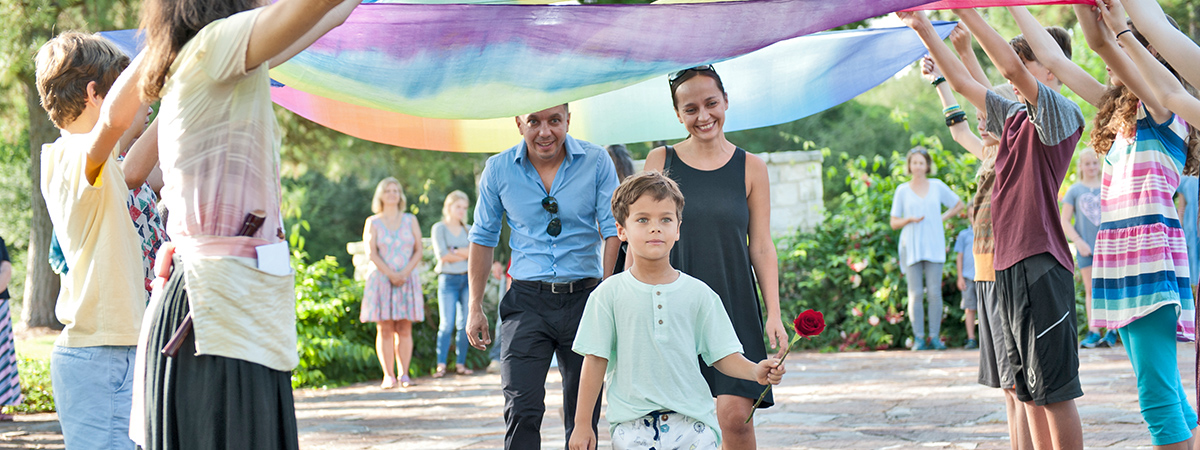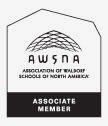Festivals are a vital part of our school life. The curriculum incorporates thematic subject matter in lesson plans and class activities with the rich history and traditions demonstrated in our festivals and assemblies. Our festivals are celebratory and focus on significant markers of seasonal change and significant values and virtues central to human development.
It is the communal nature of the festivals that connect parents, faculty and staff to the students for meaningful celebration and bonding of community ties.
Here are some of our significant festivals and events:
Autumn
The Rose Ceremony
On the first day of school each year, we hold the Rose Ceremony. The whole school joins together in welcoming the 1st graders, as their Kindergarten teachers lead them across the Golden Bridge to greet their new, 1st Grade teacher with a handshake, and receive a rose from a student from the highest grade.
Michaelmas
Michaelmas is a little-known festival in North America but it is a major celebration in schools world-wide inspired by Waldorf education. It takes place near the autumnal equinox when daylight grows shorter. The festival is named for the archangel Michael, known as a protector of humanity, who inspires qualities of courage, initiative and steadfastness. As the seasons transition from the outer warmth of summer to the coolness of fall, we turn inwards, towards ourselves and towards our community for inner warmth.We celebrate with a play about St. George, the human counterpart of Michael, taming the dragon.
The Enchanted Forest
The Enchanted Forest is presented by the grades children for the Early Childhood students and younger siblings. On or around Halloween, the forest on our property is festively decorated and modified trick-or-treating with lots of homemade goodies.
Martinmas
In early November, a Lantern Walk, commemorating St. Martin’s Day (or Martinmas) is held for the entire community. The children make their own lanterns and gather with parents and teachers, then go on a walk singing with glimmering lanterns held high, to carry light into the approaching darkness of winter. The lanterns, often decorated with stars, suns, and moons, are symbols for the children of their own individual light; and the walk into the cold, dark evening, following a story recognizing “the light” of another, gives the children an experience of caring and sharing when the darkness of winter approaches.
Winter
St. Nicholas Day
St. Nicholas visits children the night of December 5th and leaves a small treat in their shoe.
The Winter Advent Season is composed of a weekly series of related events that begin in candle-lit silence to remind us of the light shining within each individual in the midst of the encroaching darkness of the season.
Some classes and families join in the Winter Advent Spiral, a ritual procession through a spiral pathway of pine boughs leading to a lighted candle in the center.
Festive Winter Send Off
At this festive gathering before school ends for the holidays, the school children and families gather around the Christmas tree to sing the songs of the season.
Three Kings Day
Amongst the magi of ancient Persia, the priests who studied the wisdom of the stars, it was known that a bright star would one day appear in the sky, signaling the birth of a great Sun Being. Hundreds of years later, three magi saw the star and journeyed towards it to find the child, bringing as gifts gold, frankincense, and myrrh. On the first day back to school after the winter break, we celebrate this festival with a story.
Spring
May Faire
The May Faire is a celebration of May Day, an ancient festival welcoming spring. It is one of our biggest community events of the year and takes place on the first weekend in May on the grounds of the school. The school is decorated with bountiful fresh flowers and music, food, maypole dancing, and games and crafts create a fun, festive environment for families from the whole North Houston community.
Other Events
Classes may celebrate other festivals as they arise in the curriculum’s journey through the history of human cultures. Parents are encouraged to talk to the class teacher about coming in and sharing other meaningful festivals with the children.




